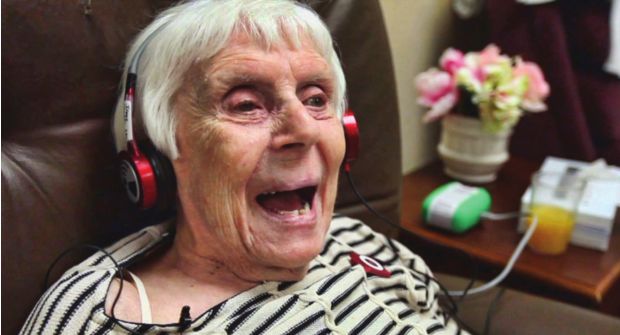
iPods for Alzheimer’s
SIU medical school uses music to help dementia patients
HEALTH | Patrick Yeagle
It had been a while since James could recall holding his newborn son in his arms. Listening to his new iPod, however, brought that memory to the surface for the 74-year-old Alzheimer’s patient from Springfield.
James is one of the patients in Springfield who received donated iPods from Southern Illinois University School of Medicine as part of an informal program exploring the power of music in dealing with Alzheimer’s disease. Created by a nursing home volunteer from New York, the program has potential to enhance the quality of life for patients with Alzheimer’s and other forms of dementia.
James is in the early stages of the disease, and his symptoms are hardly noticeable to the casual observer. He is alert and conversational, although he sometimes struggles to answer questions. However, his condition becomes more apparent when his routine is interrupted. He sometimes follows his wife, Rose Marie, around the house, questioning everything she does.
That’s where James’ new iPod comes in handy. Listening to some of his favorite music from the past – especially Barbara Streisand – helps calm James, brings out dormant aspects of his personality and even triggers old memories like his years playing trumpet in a popular dance band as a young man.
Maggie Schaver, who works at the Center for Alzheimer’s Disease and Related Disorders (CADRD) at SIU School of Medicine, says she has noticed a significant change in James’ demeanor since he started using an iPod about a month ago.
“He puts it on and he starts kind of transporting himself back into an earlier time,” Schaver said. “What I see is it kind of brings out pieces of him that I didn’t get to see before. It almost reminds him a little bit about who he is that he wasn’t able to verbalize before.”
Schaver says the iPod is a useful tool because of its simplicity. With his iPod, James can simply press a button to play music, Schaver says, rather than having to load a record or CD each time he wants to listen to music.
The program is inspired by Music and Memory, a New York-based nonprofit founded by nursing home volunteer Dan Cohen. In 2008, Cohen bought 200 iPods for patients at four New York long-term care facilities and found that the patients became more responsive and seemed happier overall after music became a regular part of their lives. Music and Memory now trains groups around the nation to replicate Cohen’s success, and Wisconsin’s Department of Health Services even implemented the program in 100 nursing homes there.
Dr. Thomas Ala, interim director of the Alzheimer’s center at SIU medical school, says patients with Alzheimer’s disease typically experience memory loss and confusion, often accompanied by a loss of initiative. Ala says the introduction of music appears to “trip a switch” in many patients’ brains, possibly renewing connections between the right and left sides of the brain that have been destroyed by the disease. The effect appears different than that of watching TV, he says, because listening to music typically doesn’t require following a plot. Exactly how music affects the brain of an Alzheimer’s patient isn’t known, Ala says, but he hopes future research will reveal that mechanism, along with other ways to use music or related stimuli to help patients.
In the meantime, however, Ala says music may be a means of improving care for Alzheimer’s and dementia patients by reducing the use of antipsychotic and sedative medications. Such drugs are used because Alzheimer’s patients can sometimes be a danger to themselves or others. Several ongoing studies are examining the potential for music to reduce the use of tranquilizers, Ala says.
Schaver says her department is accepting donations of iPods – particularly the iPod Shuffle – along with chargers. The music players get erased and loaded with custom playlists for each patient. For more information, contact Schaver at 545-7193 or by email at [email protected].